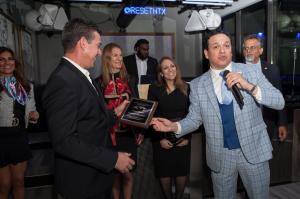From Vision to Velocity: Houston’s Global Convergence That Reshaped Low-Carbon Markets and Alliances

Nihal Darraj (left), Oumer Tahir, Emily Llinás, Fernando C. Hernandez, Gilly Rosen, Bruce Miller, and Alessandra Simone. Their respective organizations are mentioned in the article (Photo credit: Kadenco)
HOUSTON, TX, UNITED STATES, April 21, 2025 /EINPresswire.com/ -- The Society for Low Carbon Technologies (SFLCT) convened an exclusive marquee event with more than 140 global leaders during the defining 2025 Carbon Capture Utilization (CCUS) Conference via the Capture & Connect: Exclusive CCUS Mixer—as officially recognized by the conference’s organizing institutions and co-launched with the Society of Petroleum Engineers (SPE) Northern Emirates. This builds on a pivotal moment at the same conference in 2023, when SFLCT’s Chairman of the Board, Fernando C. Hernandez, convened an evening sideline meeting with 20 individuals, initiating the organization’s formation and setting in motion the strategic alliances that would drive its global expansion.
In under two years, the low-carbon organization has inked Pakistan’s first low-carbon agreement, launched clean technology diplomacy alongside the Government of Flanders in Belgium, catalyzed Uruguay’s $6 billion U.S. dollars sustainable fuels project, and played a key role in shaping South America’s first CCS law via Brazil. That trajectory came full circle in Houston, where the event gained Middle Eastern geopolitical weight—further anchored by Oumer Tahir, SFLCT’s Industry Advisory Board Member and then Head of SPE Northern Emirates. His vision was instrumental in positioning the Mixer as a strategic junction where the very logic and language now defining global decarbonization governance intersect. Hernandez remarks, “We did not gather for optics but converged to calibrate markets, reinforce partnerships, and continue architecting the next era of low-carbon action and impact."
Participants included executives, academics, government officials, industry pioneers, and non-government organization leaders—gathered not to observe but to shape the discussions of this decade and the next. Together, they advanced low-carbon diplomacy and energy strategy in motion, activating strategic levers across borders. What unfolded was a flashpoint of low-carbon realignment. SFLCT’s growth is not incidental—it reflects deep embedding within enduring alliances operating across developed and developing nations—not for proximity, but for permanence.
It is unsurprising that Hernandez and Tahir were joined by several distinguished leaders across sectors, featured in the event’s opening image, including Nihal Darraj, CO2 Storage Lead at the Global CCS Institute; Emily Llinás, Director at the American Association of Petroleum Geologists (AAPG); Gilly Rosen, Carbon Storage Resources Lead at the U.S. Department of Energy; Bruce Miller, VP of Government & Industry Affairs at SLB; and Alessandra Simone, Vice Chair at SFLCT. That same level of intentionality and institutional alignment extended to the event’s collaborators via the Society of Exploration Geophysicists, AAPG, and Energy Tech Nexus. SFLCT formally acknowledges and thanks the conference organizers—SEG, SPE, and AAPG, for their invaluable support in enabling the broader success of this convening.
The event also marked a defining moment: the first inductees were honored with the Order of Distinction of Excellence Award and appointed as Officers of the High Commission of Excellence—a title reserved for those who advance SFLCT’s mission at the highest levels of trust, strategy, and execution. The honorees included: Yosmel Sanchez, for his technical command; Llinás, for advancing cross-border coordination; Simone, for strategic CCS rigor; and Jeannie Chung (not present during the award ceremony), for institutional precision. These appointments underscore their place within the evolving choreography of the global energy transition.
The event demonstrated the power of institutional collaboration, producing a borderless convergence of insight and execution, made possible through the domestic and international supporters who were part of this watershed moment—one that continues to reverberate.
Press Relations
Society for Low Carbon Technologies
email us here
Legal Disclaimer:
EIN Presswire provides this news content "as is" without warranty of any kind. We do not accept any responsibility or liability for the accuracy, content, images, videos, licenses, completeness, legality, or reliability of the information contained in this article. If you have any complaints or copyright issues related to this article, kindly contact the author above.
NewSky Security Expands into Cyber Security Private Investigations to Combat Sophisticated Botnet and VPN Threats
CTO G. Vimal Kumar of Cyber Privilege Honored for Advancing Cyber Forensics and Digital Evidence in India
Breaking Barriers: Puerto Rican Chess Enthusiast Alex Martinez Makes History at Serbian Chess Open
Kalendarium
Więcej ważnych informacji
 Jedynka Newserii
Jedynka Newserii

 Jedynka Newserii
Jedynka Newserii

Prawo

KE proponuje nowy Fundusz Konkurencyjności. Ma pobudzić inwestycje w strategiczne dla Europy technologie
W środę 16 lipca Komisja Europejska przedstawiła projekt budżetu na lata 2028–2034. Jedna z propozycji zakłada utworzenie Europejskiego Funduszu Konkurencyjności o wartości ponad 400 mld euro, który ma pobudzić inwestycje w technologie strategiczne dla jednolitego rynku. Wśród wspieranych obszarów znalazła się obronność i przestrzeń kosmiczna. Na ten cel ma trafić ponad 130 mld euro, pięciokrotnie więcej niż do tej pory.
Firma
Były prezes PGE: OZE potrzebuje wsparcia magazynów energii. To temat traktowany po macoszemu

Choć udział odnawialnych źródeł energii w miksie energetycznym Polski jest stosunkowo wysoki i rośnie, to ten przyrost jest chaotyczny i nierównomiernie rozłożony miedzy technologiami – wskazuje Forum Energii. Dodatkowo OZE potrzebują wsparcia magazynów energii, a zdaniem Wojciecha Dąbrowskiego, prezesa Fundacji SET, ten temat jest traktowany po macoszemu. Brak magazynów powoduje, że produkcja energii z OZE jest tymczasowo wyłączana, co oznacza marnowanie potencjału tych źródeł.
Infrastruktura
Wzrost wynagrodzeń ekip budowlanych najmocniej wpływa na koszty budowy domu. Zainteresowanie inwestorów mimo to nieznacznie wzrasta

Budowa metra kwadratowego domu w Polsce kosztuje od 5,55 do 6 tys. zł w zależności od województwa – wynika z najnowszych analiz firmy Sekocenbud. Najdrożej jest w Warszawie, gdzie cena za metr kwadratowy domu przekroczyła już 6,2 tys. zł. Na przyrosty kosztów budowy domu wpływają zarówno drożejące materiały budowlane, jak i wyższe wynagrodzenia pracowników. Inwestorzy nie rezygnują jednak z budowy domów jednorodzinnych, co ma związek m.in. z wciąż wysokimi cenami mieszkań czy też obniżką stóp procentowych.
Partner serwisu
Szkolenia

Akademia Newserii
Akademia Newserii to projekt, w ramach którego najlepsi polscy dziennikarze biznesowi, giełdowi oraz lifestylowi, a także szkoleniowcy z wieloletnim doświadczeniem dzielą się swoją wiedzą nt. pracy z mediami.










.gif)

 |
| |
| |
|